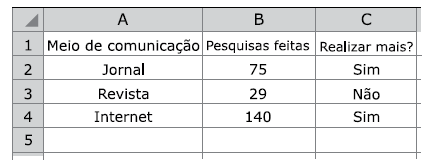Questões de Concurso
Para analista legislativo
Foram encontradas 12.173 questões
Resolva questões gratuitamente!
Junte-se a mais de 4 milhões de concurseiros!
De: [email protected] Para: [email protected] Cc: [email protected] Cco: [email protected] Assunto: [email protected]
Camila ([email protected]), ao receber a mensagem, clicou em responder a todos, e sua mensagem de resposta, automaticamente, passou a ter como destinatários, apenas
Assinale a alternativa que contém o argumento de busca que deve ser utilizado no site.

Assinale a alternativa que apresenta a fórmula que deve estar contida na célula C2, para que esta apresente o valor exibido na imagem.
1 – Digitou uma palavra. 2 – Clicou em alinhar o parágrafo à direita e apertou a tecla Enter. 3 – Digitou uma nova palavra e apertou a tecla Enter. 4 – Clicou em centralizar o parágrafo. 5 – Digitou uma nova palavra e apertou a tecla Enter. 6 – Digitou uma nova palavra e apertou a tecla Enter. 7 – Clicou em justificar o parágrafo. 8 – Digitou uma nova palavra e apertou a tecla Enter.
Após todas as ações executadas, quantos parágrafos ficaram alinhados à direita?
(https://bit.ly/2WgnfKQ. Publicado em 28.10.2019. Adaptado)
Sobre as eleições do Uruguai, é correto afirmar que
(https://glo.bo/33igOIU. Publicado em 05.02.2020. Adaptado)
As críticas se referem
(https://bit.ly/2YkkUOm. Publicado em 13.01.2020. Adaptado)
Sobre a participação do Brasil no Oscar 2020, é correto afirmar:
(https://bit.ly/2QdYXxA. Publicado em 21.01.2020. Adaptado)
Sobre Regina Duarte, em relação ao atual governo, é correto afirmar:
(https://bit.ly/3cXFevG. Publicado em 27.02.2020. Adaptado)
O texto se refere ao conflito